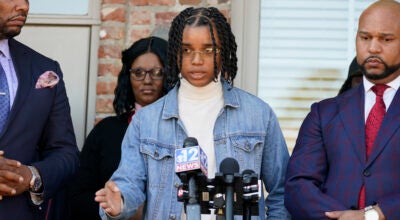Unsolved Louisiana slayings leave crushed families
Published 11:00 am Sunday, June 24, 2018
BATON ROUGE, La. (AP) — Denise Lee never wanted this job.
But over the past several months, she has spent hundreds of hours combing through social media, interrogating her own family members and pleading with potential witnesses — hoping her words will resonate enough for someone somewhere to come forward with information. She has become, in essence, an amateur detective.
On a recent Tuesday afternoon, Lee walked somberly through the aging Baton Rouge apartment complex where her son was shot and killed months earlier. She was on a mission: knocking on doors and approaching residents outside their homes.
“Were you living here in November?” she would ask them in a small voice. “Do you remember the young guy that got killed?”
“I’m his mother. He was my son — my only son.”
Most residents of the Scotland Avenue apartment complex responded to her pleas with heartfelt expressions of sympathy but apologized for not having more information. One woman said her own two brothers had been killed.
Another pointed to a patch of grass in between two buildings: that’s where she found Lee’s son after gunshots had ceased.
Lee stepped toward the spot, her body shaking with silent sobs. She leaned against the nearest building and cried for several minutes.
Then she straightened up and continued her search, noting three apparent bullet holes in the brick wall behind her.
After about an hour, Lee had accumulated some minor new details she planned to pass along to Baton Rouge homicide detectives in hopes that someday the case would be solved, her son’s killer identified and taken off the street.
“I don’t want to be mad at police, but I feel like they could be doing a lot more to investigate — like to them, he’s just another black kid dead,” she said. “I think I’m the only one actually trying to figure out what happened to my son.”
Lee said dozens of unanswered or unreturned phone calls over the past several months have led her to wonder whether detectives have abandoned her. Relatives of several other Baton Rouge homicide victims have reported a similar lack of communication from police during lengthy investigations.
The Baton Rouge Police Department declined to comment or respond to criticism from victims’ families, but department leaders have acknowledged the challenges their homicide detectives are facing: low staffing levels coupled with last year’s record number of homicides.
The national clearance rate for homicides has hovered around 60 percent in recent decades, according to federal crime data compiled by the Murder Accountability Project, a nonprofit that studies unsolved homicides across the United States. Cases are cleared when police make an arrest or when the suspect has been identified but arrest is impossible, most often because that person has died. Some suspects are arrested but never convicted because the burden of proof shifts from probable cause to beyond a reasonable doubt.
The Baton Rouge Police Department has cleared about 62 percent of its homicide cases since 2000 — higher than both state and national averages during that time. But that still means almost 40 percent of cases are never resolved.
Thomas Hargrove, founder of the Murder Accountability Project, said clearance rates are important for obvious reasons: leaving killers on the street allows them to keep killing and shows other potential offenders that they too can act without impunity.
The certainty of being caught — not the severity of punishment — is most effective in deterring crime, according to a 2016 U.S. Department of Justice report. People are more apt to think twice if they see other offenders being held accountable. Otherwise, they start to consider taking justice into their own hands, perpetuating a vicious cycle of violent crime.
“Homicides are worth solving because if you don’t, then the murder rate is going to go up,” Hargrove said. “Now you’re at the question of what is human life worth. This is literally a matter of life or death. Solving homicides saves lives.”
Chadrick “Boonie” Lee grew up in Wilson — a village of 595 people about 50 miles north of Baton Rouge — and graduated from East Feliciana High School in 2015. He had considered dropping out but ended up repeating his senior year because his mom insisted he stay in school.
Denise Lee raised her five children as a single parent, unable to provide them many luxuries aside from her own effusive expressions of pride in their accomplishments. All five finished high school and three are in college.
Lee said she started worrying about her son after his longtime girlfriend died in a car accident in March 2017. Then, he started hanging around a new group of friends and spending more time in Baton Rouge, working at a furniture warehouse on Airline Highway and pursuing his interest in rap music.
“The way he died was not the way he lived his life,” Lee said in between sobs several days after her son’s death. “He was raised in love, but he died in hatred.”
The grief is most overwhelming in the early mornings before sunrise, she said. That’s when Chad often would wake up — having gone to bed earlier than everyone else — and fix himself a bowl of cereal.
Having made it through the initial shock and unbearable pain of the loss, Lee confronted the gnawing feeling that she knew almost nothing about how her son died. She approached the men he was with that night and found out Chad left the Belle of Baton Rouge casino and was dropped off at his friends’ apartment complex not long before the shooting.
The friends told her Chad had stepped outside. They said they had heard gunshots but hadn’t seen anything.
Lee also spent hours scrolling through Instagram accounts, watching music videos posted by people who knew her son and trying to decipher meaning from the lyrics.
“I still have 1 million questions running through my head with maybe two or three answers,” she said. “I blame myself. I blame everybody. I even blame my son because I don’t know what would make someone gun down a human being like an animal and think they can get away with it.”
Families of homicide victims whose cases remain unsolved experience a unique grieving process that often centers on unanswered questions, according to Ashley Wellman, a professor at Texas Christian University who has spent years researching the topic. She said a lot of families feel like they can’t move on without some resolution.
When Lisa Rodney’s son Quindell Woods was found shot to death inside his girlfriend’s car in 2009, he left behind three small children of his own. Police have not identified any suspects or motives.
Now 13 years old, Woods’ oldest child has started asking questions of his grandmother, wanting to know why his dad was killed and who committed the murder.
“I explain things as best I know how,” Rodney said. “But there’s a hole in our family and we have no answers. We need justice and closure.”
She said her grandson wants to become a detective when he grows up “to help solve his daddy’s case.” She focuses on teaching him the importance of acting with love — not being tempted to retaliate — even in the face of anger.
Rodney started a nonprofit organization in her son’s honor that gives bikes to Baton Rouge children in need. She spoke about turning her family’s tragedy into an opportunity to help other people.
The pain of homicide often affects multiple generations, changing entire families forever as they experience “this pressure to keep their loved one’s memory alive,” Wellman said. Because they feel unable to move on, family members often take on several different roles, including being an advocate for the victim and “trying to carry out their own investigation.”
“Without them picking up the phone and bugging police, talking to the media, being the ones on the ground asking questions, there’s a very good chance their loved ones will be passed over,” she said. “Those dynamics are incredibly damaging to the grief process.”
Julietta Dunn’s daughter Stacy Gatlin, 34, was shot and killed on April 12, her body found lying in the street not far from her home off Florida Boulevard.
Gatlin spent part of her childhood in Germany, where Dunn and her family are from. Dunn fell in love with an American soldier who was stationed there and later followed him back to the United States. They had three children and eventually settled in Fort Payne, Alabama.
Gatlin graduated from high school in Fort Payne and started working in restaurants before she decided it was time for a new start. So she packed up and moved to Baton Rouge several years ago, ready for a bigger city with more opportunities.
Dunn said her daughter later began struggling with drug addiction — trying to change her life again and again without ever asking her parents for help. She described Stacy’s fierce independence, her unwavering determination and optimism.
Dunn said she has received minimal communication from detectives despite having sent them tips that she believes could be valuable to the case. She also recently made the trip from Alabama to put up flyers around the neighborhood asking residents to call police with information.
Dunn found out from the coroner that Stacy had drugs in her system and believes that investigators have given up on the case because it could be “drug related, and therefore, they’re not going to spend too much effort on it.”
“We’re getting treated like we’re nothing,” she said a few weeks after her daughter’s death. “If they would just assure the family that they are actively following up on everything, that they are working and taking every lead seriously. That’s all.”
Experts said black families often experience a similar sense that police neglect their cases because of the victim’s race.
But David Carter, a criminal justice professor at Michigan State University and former police officer, firmly disputed the notion that detectives would prioritize cases based on their circumstances or any other factors. If investigators end up with few leads in some cases, he said, it’s not because they’re focusing more attention on others.
Carter also noted the importance of building relationships with victims’ families, regardless of how their investigations are proceeding, because family members then become more likely to provide detectives with useful tips that could lead to an arrest.
Both Dunn and Lee said they received what they considered long overdue communication from detectives shortly after a Baton Rouge police spokesman was told their cases would be included in this story. Families said detectives have told them about staffing issues within the unit, which have left some investigators with heavy caseloads.
Local authorities agree that the department doesn’t have enough detectives, especially if 2018 sees a repeat of last year’s record number of homicides — 106 across East Baton Rouge Parish with the vast majority occurring within city limits. East Baton Rouge Parish District Attorney Hillar Moore III has called it “a well-known deficiency.”
“BRPD is completely shorthanded all around,” Moore said. “Surely that does significantly impact the detectives’ ability to keep up with their caseloads and be more proactive on reaching out to families. They’re overwhelmed.”
He also noted that homicide detectives respond to other suspicious deaths, including suicides and fatal drug overdoses, which have increased significantly amid the nation’s opioid epidemic.
Eight detectives are working in the homicide unit, down one from December after an officer went on medical leave, department leaders said late last month. But officials are planning to increase that number and distributed a job posting among officers. Historically, the unit has included about 12 detectives.
The FBI recommends that in departments with more than 50 homicides per year, each detective be made the lead investigator on no more than five cases a year because higher caseloads can lead to lower clearance rates. The numbers in Baton Rouge suggest detectives are well above that benchmark — working about double the recommended caseload in 2017.
Given low staffing levels across the department, leaders have said that adding to the unit would mean they’d “have to rob Peter to pay Paul.” Moore also said attracting the right officers can be challenging because of the workload, long hours and public scrutiny that the job entails.
Jill Leovy, the author of “Ghettoside: A True Story of Murder in America,” spent years embedded with Los Angeles homicide detectives while reporting on crime. She said the problem of scarce resources isn’t unique to Baton Rouge. The national conversation surrounding criminal justice has remained largely the same for decades — often focusing on how to prevent crime — and has consistently failed to consider the grave importance of “giving answers to homicide victims.”
“The whole American policing tradition has been preventive. We’ve never put solving serious violent crimes first,” she said. “I think we need a broader and deeper intellectual response to homicide. We need to step back, be more astonished and think about this from the ground up.”
Lee celebrated her youngest daughter’s high school graduation in May — “a joyful occasion” despite the persistent grief over her son’s death. She recently went back to work.
“I’m not going to stop searching, but I have to go on with my life,” she said. “I’m not trying to handicap myself because he’s not coming back. . I have other kids that need me.”
While preparing herself for the possibility that her son’s case will remain unsolved, Lee is still hoping for closure and begging for the community to come together and confront what she calls a “ridiculous amount of black-on-black crime.”
“Above all, I just want people to go to the police and trust that the police will help get justice,” she said. “But until it happens to them, they don’t care. They’re not feeling my family’s pain.”




